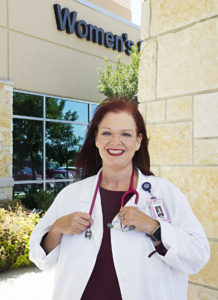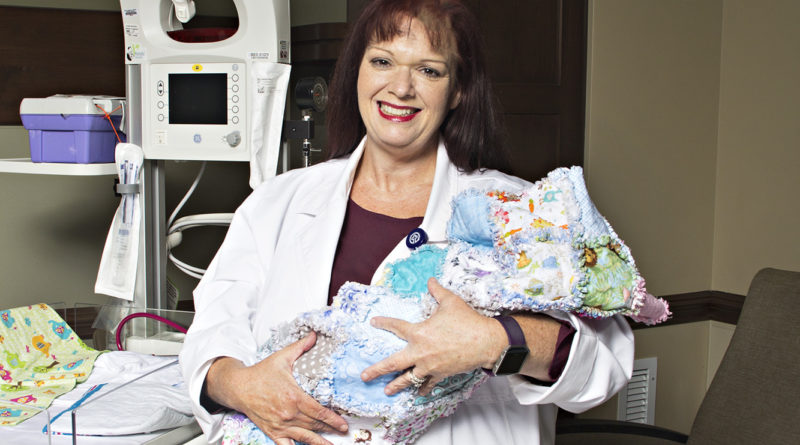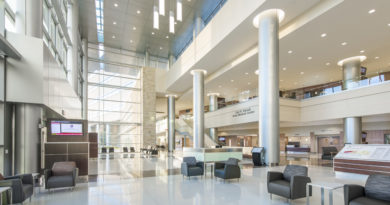Nurturing newborns
Heidi Cantrell directs women’s services at Seton Harker Heights
By Catherine Hosman
Photography by Becky Stinehour
Heidi Cantrell has a twinkle in her eye and an impish smile when she speaks. She enjoys her job helping moms bring their new babies into the world. She’s been doing it since 1995.
 Heidi is the director of women’s services at Seton Medical Center Harker Heights. Since January 2017 she has lead a facility with eight labor, delivery, recovery, postpartum rooms (LDRPP) and 10 post-delivery rooms. There is also a three-bed triage area and an emergency nursery.
Heidi is the director of women’s services at Seton Medical Center Harker Heights. Since January 2017 she has lead a facility with eight labor, delivery, recovery, postpartum rooms (LDRPP) and 10 post-delivery rooms. There is also a three-bed triage area and an emergency nursery.
LDRPP rooms are equipped with everything a doctor or nurse would need, strategically placed in the room for immediate access, Heidi says. Since these are birthing rooms, there is also a radiant warmer for the babies. Unless an emergency presents itself, newborns get to stay in the room with their mothers.
“We take care of the mother throughout the pregnancy and we take care of newborns after the delivery,” she says.
Finding the right staff is essential to the care mothers receive. Heidi also researches best practices, assists and implements those practices and works with physicians.
“We do whatever it takes to give care to the moms and babies who come here,” she says.
Heidi keeps up with the latest innovations in obstetric care by reading the Physician Guidelines and Reports from the American College of Obstetrics and Gynecologists (ACOG) and attending meetings of the Association of Women’s Health, Obstetrics and Neonatal Nurses (AWHONN), a nonprofit organization that promotes the best practice in the care of women’s health to neonatal nurses.
She traveled 90 minutes to south Austin for AWHONN meetings until the State Section President, Shellie Nelson, suggested she start a chapter in Harker Heights.
“I’ve been the chapter president since October 2017, covering Killeen, Waco, Temple and Belton,” she says. “For my first meeting, only four people showed up. The second meeting, 13 people showed up.”
The chapter donates baby items to the community where meetings are held. At a recent meeting in Waco diapers were donated to a local organization. “It’s good for babies,” Heidi says. “It’s good for nurses who want to improve the care of mothers in Central Texas.”
Nurturing the internal nerd
Heidi, 52, was born in Bogalusa, Louisiana, to an Army family. She and her two brothers spent their growing-up years on Army bases in Louisiana, Germany, San Diego and Fort Sam Houston.
“Being a military brat, everyone in the neighborhood was in the same socioeconomic group. We were all alike,” she says.
Of all the places her family lived when her father was active Army, she said Fort Sam Houston was her favorite. “Whenever we had family come, we went to the Quadrangle. There were tanks we could climb on, ducks and geese we could feed,” she says.
Her father retired from the military after 26 years of service and moved his family to Brownsboro, his hometown. “There were 476 people in the town,” she says. “Everyone knew everybody or was related. I went to school with the same people from sixth grade to (high school) graduation.”
High school football games were the place to be on Friday nights, but basketball was the big game in this tiny East Texas town. Cantrell says she played on the junior high-school team, but wasn’t very good.
“They made me the manager. They make you the manager when you are not very good,” she says.
Heidi was a nerd before it became fashionable. She loved all things science and biology. In high school she was a member of the science and math club. She graduated from Trinity Valley Community College with her associate’s degree, and worked as a medication clerk at a local nursing home. She hadn’t thought about going back to school. But she knew she needed to do something else.
Her late father encouraged her to go to nursing school. “‘Go be a nurse,’ he told me. ‘You are always taking care of animals and people. Go be a nurse.’” But her free spirit wasn’t quite ready to make the commitment. She was enjoying life in her 20s and even owned her own home.
Eventually she found her way to the University of Texas at Tyler to pursue her degree in nursing science. “I was really independent and nursing school is intense,” Heidi says. “The further I went into my nursing studies, the harder it got.”
When her father asked her to move back home so she could finish school, she had a moment of uncertainty. It meant selling her house and living under her parents’ roof again. It also meant no mortgage. “I would have my old room,” she says. She took her dad up on his offer, sold her house and moved back home to finish school. “I didn’t have to worry about a house payment and went from working 40 hours a week to 16. Overcoming independence in a structured environment was one of the hardest things I had to do.”
One morning during her last year in nursing school she ran into an old childhood friend, Gary Cantrell, at a gas station. He asked Heidi if she was seeing anyone. She replied, “No.” That night they met for dinner and one year later, in 1994, they married during her last semester. “I didn’t live by myself anymore,” says Heidi, who married at 28.
Now she is the mother of two daughters, Rebecca, 12, and Rachel, 23. Next March she and Gary, a retired LVN and veteran, will celebrate their 25th wedding anniversary. Heidi continued her education to earn a master’s degree in health administration and is currently working on her master’s degree in nursing.
Except for a stint as the director of women’s services at Fairview Park Hospital in Dublin, Georgia, Heidi spent 19 years working at the East Texas Medical Center in Athens. She began her career in medical surgical telemetry, but soon learned that obstetrics was her medical calling. She worked as a director and manager of women’s services at various hospitals before accepting her current position at SMCHH.
Heidi admits that she misses being at the patient’s bedside as much as she once was. However, in her current position she says she enjoys helping nurses stay current with the latest information in obstetrics.
“A large part of my job is to make sure nurses have the tools they need to be successful. Being a nurse is so important. What you do affects lives. You touch people,” Heidi says. “I find it rewarding when I see a nurse find what gives them passion.”



